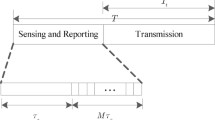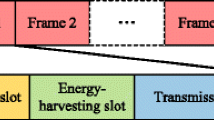Abstract
In this paper, considering imperfect spectrum sensing in a cognitive cooperative system, we study the performance optimization for throughput maximization of secondary user (SU) and average delay minimization under maximum delay constraint of primary user (PU) with harvested energy from radio frequency signal of active PU by cooperative SU. We use a one-dimension linear search method to decompose the two optimization problems due to the non-convexity of the original optimization. We prove that the above maximization and minimization have same forms of solution under the same constraints. Simulation results indicate that the throughput performance of SU is higher than that of traditional cognitive system.








Similar content being viewed by others
References
Mitola, J., & Maguire, G. Q. (1999). Cognitive radio: Making software radios more personal. IEEE Personal Communications, 6(4), 13–18.
Zhang, T., Chen, W., Han, Z., & Cao, Z. G. (2014). Hierarchic power allocation for spectrum sharing in OFDM-based cognitive radio networks. IEEE Transactions on Vehicular Technology, 63(8), 4077–4091.
Kang, X., Liang, Y.-C., Garg, H. K., & Zhang, L. (2009). Sensing-based spectrum sharing in cognitive radio networks. IEEE Transactions on Vehicular Technology, 58(8), 4649–4654.
Azarian, K., El Gamal, H., & Schniter, P. (2005). On the achievable diversity-multiplexing tradeoff in half-duplex cooperative channels. IEEE Transactions on Information Theory, 51(12), 4152–4172.
Ali, A., Ejaz, A., Jabbar, M., Hameed, K., Mushtag, Z., Akhter, T., et al. (2016). Performance analysis of AF, DF and DtF relaying techniques for enhanced cooperative communication. In Six international conference on innovative computing technology (INTECH) (pp. 594–599), Dublin, Ireland.
Omar, M. S., Naqvi, S. A. R., Kabir, S. H., & Hassan, S. A. (2017). An experimental evaluation of a cooperative communication-based smart metering data acquisition system. IEEE Transactions on Industrial Information, 13(1), 399–408.
Ashour, M., El-Sherif, A. A., Elbatt, T., & Mohamed, A. (2015). Cognitive radio networks with probabilistic relaying: Stable throughput and delay tradeoffs. IEEE Transactions on Communications, 63(11), 4002–4014.
Krikidis, I., Devroye, N., & Thompson, J. S. (2010). Stability analysis for cognitive radio with multi-access primary transmission. IEEE Transactions on Wireless Communications, 9(1), 72–77.
Wang, N., & Gulliver, T. A. (2015). Queue-aware transmission scheduling for cooperative wireless communications. IEEE Transactions on Communications, 63(4), 1149–1161.
Rong, B., & Ephremides, A. (2012). Cooperative access in wireless networks: Stable throughput and delay. IEEE Transactions on Information Theory, 58(9), 5890–5907.
Elmahdy, A. M., El-Keyi, A., Elbatt, T., & Seddik, K. G. (2017). Optimizing cooperative cognitive radio networks performance with primary QoS provisioning. IEEE Transactions on Communications, 65(4), 1451–1463.
Salman, M., El-Keyi, A., Nafie, M., & Hasna, M. (2016). Novel cooperative policy for cognitive radio networks: Stability region and delay analysis. In IEEE wireless communications and networking conference (WCNC) (pp. 1–7), Doha, Qatar.
Kulkarn, K., & Banerjee, A. (2016). On stable throughput of cognitive radio networks with cooperating secondary users. IEEE Transactions on Communications, 64(10), 4097–4110.
Zhang, T., Chen, W., Han, Z., & Cao, Z. G. (2015). A cross-layer perspective on energy-harvesting-aided green communications over fading channels. IEEE Transactions on Vehicular Technology, 64(4), 1519–1534.
Zhang, J. H., Nguyen, N. P., Zhang, J. Q., Palacios, E. G., & Le, N. P. (2016). Impact of primary networks on the performance of energy harvesting cognitive radio networks. IET Communications, 10(18), 2559–2566.
Yan, J., & Liu, Y. (2016). Dynamic energy harvesting in cooperative cognitive radio networks. In IEEE Globecom Workshops (pp. 1–6), Washington, DC, USA.
Hoang, D. T., Niyato, D. T., Wang, P., & Kim, D. I. (2015). Performance optimization for cooperative multiuser cognitive radio networks with RF energy harvesting capability. IEEE Transactions on Wireless Communications, 14(7), 3614–3629.
Ashraf, M., Shahid, A., Jang, J. W., & Li, K. G. (2017). Optimization of the overall success probability of the energy harvesting cognitive wireless sensor networks. IEEE Access, 5, 283–294.
Shafie, A. E., & Sultan, A. (2013). Optimal random access for a cognitive radio terminal with energy harvesting capability. IEEE Communication Letters, 17(6), 1128–1131.
Lu, Y., Wang, W., Zhang, Z. Y., & Huang, A. P. (2014). Random access for a cognitive radio transmitter with RF energy harvesting. In IEEE global communications conference (GLOBECOM), Austin, USA. https://doi.org/10.1109/GLOCOM.2014.7036927.
Kleimrock, L. (1975). Queueing systems: Theory (Vol. 1). New York: Wiley-Interscience.
Krikidis, I., Charalambous, T., & Thompson, J. S. (2012). Stability analysis and power optimization for energy harvesting cooperative networks. IEEE Signal Processing Letters, 19(1), 20–23.
Ashour, M., Butt, M. M., Mohamed, A., Elbatt, T., & Krunz, M. (2016). Energy-aware cooperative wireless networks with multiple cognitive users. IEEE Transactions on Communications, 64(8), 3233–3245.
Loynes, R. M. (1962). The stability of a queue with non-independent inter-arrival and service times. Mathematical Proceedings of the Cambridge Philosophical Society, 58(3), 497–520.
Boyd, S., & Vandenberghe, L. (2004). Convex optimizition. Cambridge: Cambridge University Press.
Acknowledgements
This work is supported by the National Natural Science Foundation of China under Grant No. 61501202.
Author information
Authors and Affiliations
Corresponding author
Rights and permissions
About this article
Cite this article
Wang, Y., Zhao, X. & Liang, H. Performance optimization for energy harvesting cognitive cooperative networks with imperfect spectrum sensing. Wireless Netw 25, 4611–4623 (2019). https://doi.org/10.1007/s11276-018-1754-8
Published:
Issue Date:
DOI: https://doi.org/10.1007/s11276-018-1754-8




